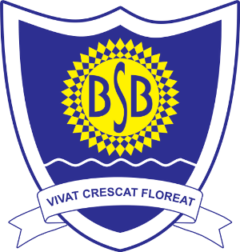Kurikulum
BSB is an English Medium School. Children in BSB’s Primary Department follow a combination of the Cambridge Primary Curriculum and the National Curriculum of England and Wales. Both are adapted in line with the school’s international context.
The three core subjects (Literacy, Numeracy & Science) are given the statutory weekly time allowance. They take almost half of the available teaching time in specifically structured and focused lessons.
The other foundation subjects include History, Geography, Art, ICT, Design & Technology, Music, PSHE, and PE. ICT, PE, Art, and Music are taught by specialist teachers and not the class teacher. Children use a scheme for the core subjects.
BSB Primary School children use the Nelson and Collins series for Literacy, the Abacus Evolve Framework Edition (Pearson Publishers) for Numeracy, and the Collins International Science series (endorsed by Cambridge). These provide opportunities for assessment throughout the school year.
Besides, pupils study topics in Geography and History from the English National curriculum.
The Oxford Reading Tree is the core reading scheme for all pupils. The Nelson Handwriting script is the accepted style of handwriting at BSB Primary School. Also, KS 1 classes use Jolly Phonics.
Full details of the curriculum are available via the Primary Department’s Administrative Office or the Principal. This includes the structure of the curriculum for Key Stages 1 and 2.
Azeri studies are mandatory for all Azeri Nationals. This is taught alongside the formal English Curriculum to provide Azeri citizens with the required Azeri Certificate. These lessons form part of the normal timetable in both the Primary and Secondary Departments. Non-Azeri pupils are given additional Literacy lessons with our support department during the 2 hours of weekly Azeri teaching.
An SEN department accommodates children’s learning needs and provides support to teachers through classroom intervention and training. These departments’ emphasis is to have an inclusive approach and encourage differentiated learning in the class environment. However, they can provide some individual support and individual counseling if appropriate.
Training in the SEN department is ongoing to ensure that teachers are familiar with the latest techniques and methodology. Global English ESL books are used to assist learners who require them.

In our Early Years at BSB we follow the British Early Years Foundation Stage
(EYFS) Curriculum. This is a birth to 5 curriculum which outlines developmental as well as academic stages as children grow and develop.
Our Approach
In our Early Years at BSB we follow the British Early Years Foundation Stage (EYFS) Curriculum updated in September 2017. This is a birth to 5 curriculum which outlines developmental as well as academic stages as children grow and develop.
The curriculum is divided into 7 areas of learning and these areas are further divided into 3 prime and 4 specific areas:
Prime areas:
- Personal, Social and Emotional Development
- Communication and Language
- Physical Development
Specific areas:
- Literacy
- Mathematics
- Understanding of the world
- Expressive Arts and Design
- At BSB we will initially focus strongly on the three prime areas, which are the basis for successful learning in the other four specific areas. It is expected that the balance will shift towards a more equal focus on all areas of learning as children grow in confidence and ability within the three prime areas. But throughout the Early Years, if a child’s progress in any prime area gives cause for concern, we will discuss this with the child’s parents and/or carers and agree how to support the child.
For children whose home language is not English, we will take reasonable steps to provide opportunities for children to develop and use their home language in play and learning, supporting their language development at home. Our aim is also to ensure that children have sufficient opportunities to learn and reach a good standard in English language during their time in our Early Years: ensuring children are ready to benefit from the opportunities available to them when they begin Year 1.
➡️ Lower Primary (Key Stage 1) – (5-7 years old)
At British School in Baku, we aim to provide a curriculum with learning opportunities that recognize and celebrate each child’s individual uniqueness, develop their full potential and prepare them to meet new challenges.
The Primary Program focuses on developing English, Mathematics and Science skills in young children. It provides a natural progression through the stages of primary education and focuses on what children should be able to do at each of the primary stages. Other subjects taught in Primary are: History, Geography, Computing, Art, Music, Physical education and PSHE.
It is designed to help parents gain a greater understanding of their children’s abilities, and their strengths and weaknesses. This is very important, as it helps teachers to know which areas to focus on for each child.
➡️ Upper Primary (Key Stage 2) – (7-11 years old)
From the beginning of the Upper Primary: it provides teachers with a summative assessment at the end of each academic year in English, Mathematics and Science. These tests are called Cambridge Primary Progression Tests, which are marked by the teacher. These tests enable teachers to track the progression students are achieving as they progress through the Upper Primary years and supplies teachers with an International benchmark.
Children completing Year 6 have the opportunity to sit the external Cambridge Primary Checkpoint examinations within all three subject areas. Checkpoint is designed to supply feedback to teachers, pupils and parents: providing them with a transferable indication of academic progress and achievement. Students who sit the examinations also receive certification of achievement.
The Cambridge International Primary Programme is an excellent framework for learning in the primary years and provides a solid foundation for progression to secondary education, including Cambridge IGCSE.
